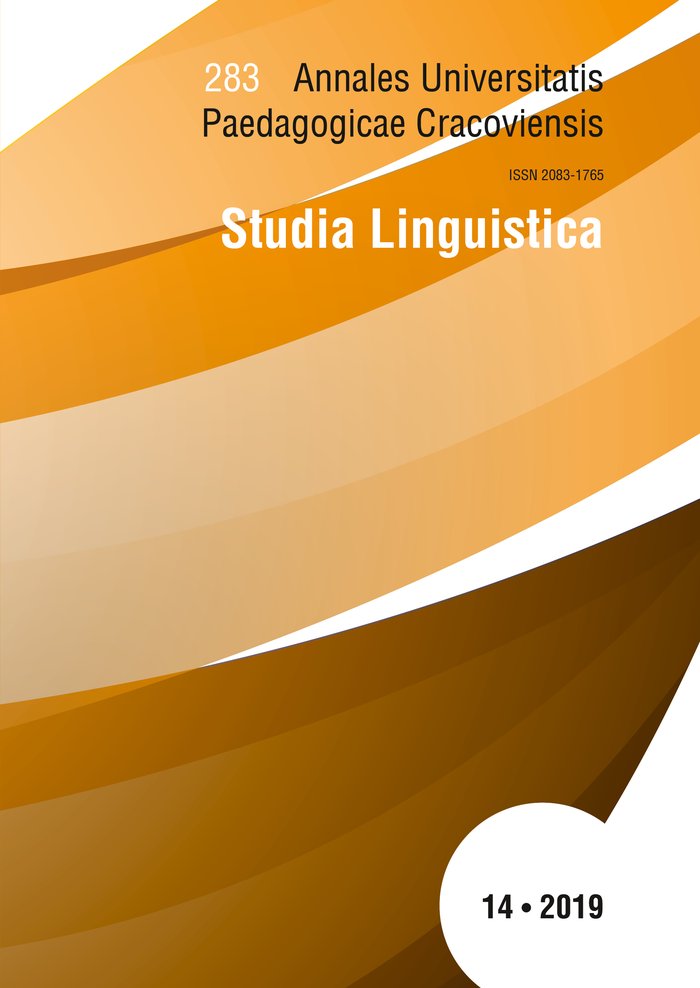Some Remarks on the Bilingualism of Nineteenth-Century Inhabitants of the Bug River Villages in the Works by Leon Kunicki (As Exemplified by the Novel Iwanko)
Main Article Content
Abstract
The article presents the phenomenon and mechanisms of the development of bilingualism among the nineteenth-century inhabitants of villages situated on the Bug River. The issue is principally exemplified by the novel Iwanko [Ivanko] by Leon Kunicki (1828-1873), a writer associated with southern Podlasie (the Włodawa area). Referring to different situational contexts of the characters in the novel, the author of the study has shown the mechanisms of switching linguistic codes: Polish and Ukrainian. An illustration of these complex communication processes is the Greek Catholic (Uniate) community of Horodno village. The status and prestige in a bilingual community stem from non-linguistic causes, as shown by the cited examples from the novel. The acquisition of Polish by Podlasian Ruthenians is one of the basic conditions for job promotion and, sometimes, social advancement. According to the author of the study, the novel analysed is a good philological source for investigating language contacts on the Polish-Ukrainian borderland.
Downloads
Article Details
Author, submitting a text to the editorial board of the journal “Annales Universitatis Paedagogicae Cracoviensis. Studia Linguistica", certifies that the content of the article has not been published so far and that the work does not violate in any way the copyright or related rights of other person, as well as other rights of third parties, and that no one's rights to the work (or any part thereof) have been missed. After signing the contract, the property rights to the published materials are transferred to the University of the National Education Commission, Krakow.
“Annales Universitatis Paedagogicae Cracoviensis. Studia Linguistica” is an open access journal, and all its content is made available free of charge to users and institutions under the Creative Commons CC-BY-NC-ND 4.0 license (attribution, non-commercial use, no derivative works). Under this license, the authors agree that their work may be lawfully reused for any purpose, except for commercial purposes, without the prior consent of the author or publisher. Everyone can read, download, copy, print, distribute and process these works, provided that the author's marking and the original publication place are correct. Published texts may not be used to create derivative works (e.g. to translate and publish in another language without the consent of the publisher). This is in line with the BOAI (Budapest Open Access Initiative) definition. "Studia Linguistica" does not charge for submitting or processing articles.
References
Arkuszyn H., 2006, Słownyk mikrotoponimiw i mikrohidronimiw piwniczno-zachidnoji Ukrajiny ta sumiżnych zemel, t. I A–K, t. II L–Ja, Łuc’k.
Google Scholar
Arkuszyn H., 2007, Hołosy z Pidlaszszia (Teksty), Łuc’k.
Google Scholar
Czopek B., 1988, Nazwy miejscowe dawnej ziemi chełmskiej i bełskiej (w granicach dzisiej- szego państwa polskiego), Wrocław–Warszawa–Kraków–Gdańsk–Łódź.
Google Scholar
Czyżewski F., 1994, Fonetyka i fonologia gwar polskich i ukraińskich południowo-wschod- niego Podlasia, Lublin.
Google Scholar
Czyżewski F., 2013, Język Kajetana Kraszewskiego na tle polszczyzny XIX-wiecznej, [w:] Kraszewscy na Podlasiu, red. F. Czyżewski, Z. Fronczek, A. Sitko, Wisznice, s. 9–29.
Google Scholar
Kobylińska J., 1990, Gwara w utworach Władysława Orkana, Kraków. Kobylińska J., 1997, Świat językowy Władysława Orkana. Słowa i stereotypy, Kraków.
Google Scholar
Kość J., 1999, Polszczyzna południowokresowa na polsko-ukraińskim pograniczu języko- wym, Lublin.
Google Scholar
Kraszewski K., 2000, Kronika domowa. Wspomnienia i zapiski dzienne z lat 1830–1881, oprac. i wstęp Z. Sudolski, współprac. I. Najda, Warszawa.
Google Scholar
Krzyżanowski J., Hernas C. (red.), 1984, Literatura polska. Przewodnik encyklopedyczny, t. I A–M, Warszawa [hasło: Leon Kunicki, Kazimierz Władysław Wójcicki].
Google Scholar
Kunicki L., 1860, Iwanko. Powieść, Warszawa.
Google Scholar
Kunicki L., 1872, Wyjątek z kroniczki mojej okolicy. Z notat Pana Marcina, Warszawa.
Google Scholar
Kuraszkiewicz W., 1985, Ruthenica. Studia z historycznej i współczesnej dialektologii wschodniosłowiańskiej, Warszawa.
Google Scholar
Kuraszkiewicz W., 1989, Uwagi o gwarze polskiej na Podlasiu 50 lat temu, „Zeszyty Nadów, [w:] Językowe i kulturowe dziedzictwo Wielkiego Księstwa Litewskiego. Księga jubileuszowa na 1000-lecie Litwy, red. J. Mędelska, Z. Sawaniewska-Mochowa, Bydgoszcz, s. 109–115.
Google Scholar
Łesiów M., 1973, Gwary ukraińskie na terenie Polski Ludowej, „Slavia Orientalis” XXII, s. 67–78.
Google Scholar
Łesiów M., 1997, Ukrajinśki howirky u Polszczi, Warszawa.
Google Scholar
Łesiów M., 2013, Błogosławieni męczennicy podlascy w świetle imiennictwa osobowego, [w:] Niejedno ma imię... Prace onomastyczne i dialektologiczne dedykowane Profesor Ewie WolniczPawłowskiej, red. E. Dzięgiel, T. Korpysz, „Prace Językoznawcze Instytutu Filologii Polskiej UKSW”, t. IV, s. 247–262.
Google Scholar
Pelica G.J., 2009, Ślady zapomnianego piękna. Włodawa i okolice, Włodawa.
Google Scholar
Pelica G.J., 2018, Ile cerkwi zburzono?, [w:] 1938. Jak burzono cerkwie, red. E. Czykwin, A. Radziukiewicz, Białystok, s. 108–111.
Google Scholar
Walczak B., 2010, Języki na pograniczu Wschód–Zachód w Rzeczypospolitej Obojga Narodów, [w:] Językowe i kulturowe dziedzictwo Wielkiego Księstwa Litewskiego. Księga jubileuszowa na 1000lecie Litwy, red. J. Mędelska, Z. Sawaniewska-Mochowa, Bydgoszcz, s. 109–115.
Google Scholar
Walczak B., 2015, Pogranicze polsko-wschodniosłowiańskie od Średniowiecza do dziś, [w:] Pogranicza słowiańskie w opisach językoznawczych. W 110 rocznicę urodzin Profesora Władysława Kuraszkiewicza (1905–1997), red. F. Czyżewski, M. Olejnik, A. Pihan-Kijasowa, Lublin–Włodawa, s. 149–155.
Google Scholar
